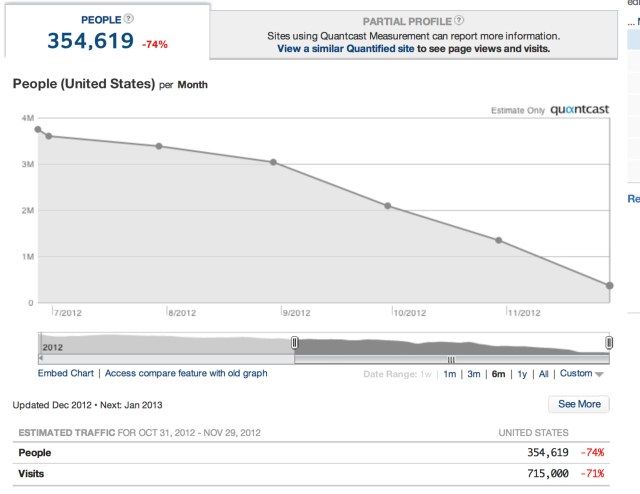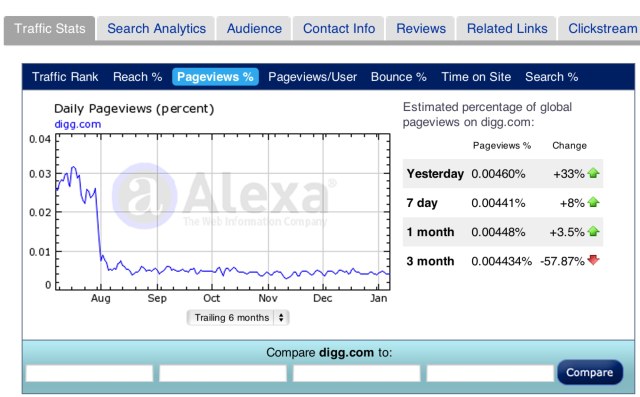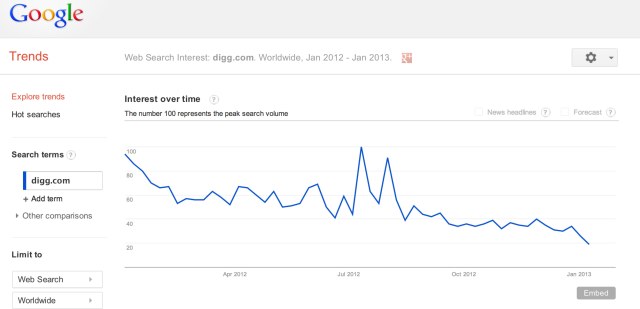Digg today took to its blog to share a bit of information about its user growth and monetization plans, now that it’s been at Betaworks for nearly six months. The company said that Digg’s user base has doubled since the Betaworks takeover in August, and it also confirmed that Digg’s “Apps We Like” section is one of the site’s first efforts to monetize the new property.
While the company didn’t offer up exact numbers in terms of users, it told TechCrunch in October that it had seen 1.7 million visits to Digg since the redesign.What’s interesting, however, is that, at least according to third-party measurements, website traffic is down. For example, in the charts pictured below from Quantcast, Alexa, and Google Trends, it looks like Digg.com saw declines since Betaworks took over. That being said, it’s well known that measurement firms often have wildly inaccurate data, so take this with the proverbial grain of salt. For the most part, these services are only good at measuring whether a site is gaining or losing traffic over long periods of time, not for citing every little peak or drop.
Based on referral traffic reports, Digg seems to be improving. Although no longer the king-maker it once was, Digg still sends good referral traffic here on occasion, and at The Atlantic as well. BuzzFeed proclaimed Digg is back. This doesn’t necessarily prove user numbers are growing significantly, only that user engagement is. But that’s a good place to start.
As noted in Digg’s blog post today, the company also offers mobile versions of Digg, including both an iPhone and iPad application, which have each been featured by Apple at some point. It also has an email product called The Daily Digg.
The email product is just now getting started, says Jake Levine, Digg GM. “Once we get that product up and running, it will be an important part of these efforts,” he tells TechCrunch. “We have — along with the site, the apps, and the large Twitter and Facebook accounts — just over 10 million email addresses. These are people who signed up for digg in the last few years.”
Currently, measurement firm Distimo ranks Digg #151 in the free News apps section of its leaderboards for iPhone, and it’s #162 on iPad. So even here on mobile, the company faces challenges ahead in a crowded market where users are still defaulting to traditional news media like CNN, WSJ, NPR and others, as well as those newer apps which have stolen Digg’s glory during its decline, like Flipboard (#3 and #2, iPhone/iPad ) and Reddit (#5 and #26, iPhone/iPad).
Still, it’s early days for the new Digg. TechCrunch’s co-editor Alexia Tsotsis wrote this fall that the company has a fighting chance. The team acknowledges in the post that it has much left to do, saying that the product is “1% done.” But despite its unfinished state, the site is already beginning to experiment with monetization. These efforts include an “Apps We Like” sponsored section, whose debut was covered in winter 2011.
Here, the company offers an app recommendation on one section of its website, which is clearly labeled “sponsored.” The app is chosen because its one that appears “at the top of the App Store or on TechCrunch,” the post reads. (Hey, thanks!) To date, Digg has run nine featured apps, of which three have been sponsored. It has featured Picturelife (running now, sponsored), Voyager, InstaCRT, Zapd (sponsored), FrankSaidWhat, Manga Camera, Tapestry (sponsored), Chirp.io, and 8bitcamera. A few more will arrive in the coming weeks.
The company has run a few experiments with pricing, but Levine says that they found startups like to “keep it simple.” That is, if selected, apps will pay a flat fee.
This featured section is set to grow, too. “We will definitely create a standalone section for apps that we have featured,” Levine says in response to our question about whether this area would become a larger portion of Digg in the future. “One of the things we are tracking carefully here is user response to the program — most importantly, are users sharing the Apps We Like? Authentic RT’s, Likes, Reblogs and Shares are the currency of the social web — thats what startups want to see.”
He adds that the company is open to anything else that fits the monetization strategies outlined in today’s blog post, and that he’s interested in doing a “Things We Like” for gadgets, and small uni-purpose, Pebble-like, products. “I think our users would be really into that,” he says.
Digg’s efforts are perhaps even more relevant, in light of the recent conversations and debates about how news outlets should monetize in the web era. Specifically, the latest chatter has been about BuzzFeed, thanks to its recent funding, profitability, and reports of skyrocketing valuations. Like BuzzFeed, Digg’s “Apps We Like” section is meant to blend in with the rest of the site’s content, as opposed to interrupting it, the way that sidebar ads, banners and other more traditional web ads often do. (Cough, glances to sidebar.)
How users seem to feel about this type of advertising says a lot about the nature of its audience, and how they perceive the news outlet providing the recommendations. Does BuzzFeed lose integrity by having sponsored posts like “20 Reasons to Remember to Logout?” if they’re also kind of funny? Probably not. Likewise, if Digg has users’ trust, then a recommendation could prove powerful for advertisers, the site and readers alike.



